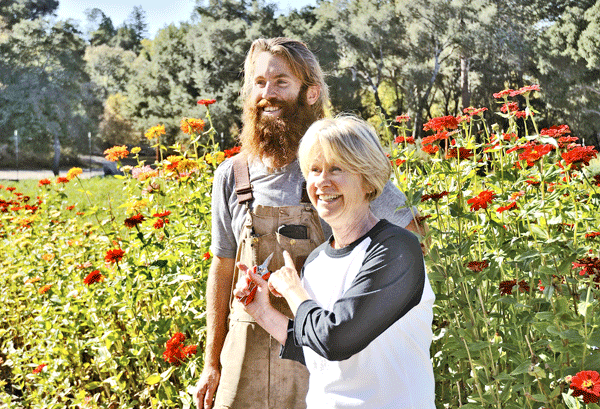
The future of local farming could be taking place in Scotts Valley, as a local woman’s partnership with a young farmer to covert her seven-acre property into a functioning farm has proven bountiful for both.
When Sue Draper and her late husband, Lee, purchased the property at 333 Lockhart Gulch Road in 2002, it was their dream to one day grow their own organic food.
“We had visions of a garden — not a farm — and we’d feed our friends forever,” Draper said.
For many years, the couple worked to clear out the overgrown property and, by the time Lee Draper passed away after a long battle with cancer in 2009, the property was ready.
It was through one of her husband’s final wishes — that she attend a taping of “The Oprah Winfrey Show” — that their dream was able to take the next step.
While attending the taping, Draper said, the audience participated in a drawing for a grand prize of $25,000. When her name was announced as the winner, she said, she knew it was a sign that bigger things were at work.
Draper, along with her son, Matt Draper, daughter Kelsey Draper-Phillips, and daughter-in-law Mandy Draper worked to use the prize money establish what would become known as Bee Fruitful Farms — a hands-on educational farm designed to teach sustainable, organic farming to the community.
However, the Draper family — real estate agents and civil engineers — were long on enthusiasm and short on agricultural know-how.
While searching for advice on organic farming, fate struck again.
Thomas Herzog, a young electrical engineering major turned farmer, was looking to make a career for himself in organic agriculture, but finding few local opportunities when he crossed paths with the Drapers.
Herzog, a proponent of natural process agriculture who studied under eco-friendly farming pioneer Bob Cannard of Green String Farm in Petaluma, found that he and the Drapers were of like personalities and entered into what Sue Draper describes as a “symbiotic” partnership.
“We both felt the same way (about sustainable farming),” she said. “There was no reason for us to be separate.”
In exchange for planting, developing, and harvesting crops on the Drapers’ property, Herzog sells the produce at local farmer’s markets under his own label, Stone Meal Farms, and keeps the proceeds — all the while refining his technique and learning the business side of farming.
“For me, it’s a huge learning experience,” said Herzog. “I’m trying to make it as a small farmer.”
The name “Stone Meal Farms” refers to the compost tea method that Herzog uses to keep the soil healthy and productive.
Designed to replicate the effects of a fertile flood plain, Herzog fertilizes the soil with a liquid concoction he calls “Mountain Tea” — composed of ground up volcanic rock (stone meal), compost, molasses, and nonchlorinated water.
The combination of those ingredients simulates the minerals and nutrients that flood waters would ordinarily deposit onto arable land to keep it vital and healthy.
“It’s water with all the microorganisms that are in the compost,” he said of his compost tea. “We rejected nature’s gift, so I’m mimicking that.”
The land has responded to Herzog’s work, as he and the Drapers were able to harvest 39 different crops this year alone.
“I’ve probably harvested four tons of produce out of here,” Herzog said.
Not all of the produce is harvested, he said, explaining that by leaving some of it behind, it helps replenish the soil.
“We take too much from the soil,” Herzog said. “Fifty percent for the soil, 50 percent for humans.”
Due to the high price of land in Santa Cruz County, Draper said, outside-the-box arrangements like this may be the only way to give first-generation farmers such as Herzog a chance to succeed in the Monterey Bay region.
“We need farmers, and there’s no place to go — the property is too expensive,” Draper said. “He could make a living here, that’s my goal.”
The educational side of Bee Fruitful Farms is taking off as well, as Herzog and the Drapers hosted a community event — the first, they hope, of many — in October to show the progress that has been made in just a year.
The educational farm is as much for adults as it is for children, Mandy Draper said, adding that it was important — for children especially — to see how their food is grown.
“We want the kids to see (how food is grown),” she said. “They’re given so few opportunities to see nature, how can we expect them to nurture it?”
The fence along the rows of vegetables and fruits is festooned with information about growing sustainably, as well as farm-centric children’s games.
Next year, Sue Draper said, Bee Fruitful Farms will be hosting regular community tours, as well as farm-to-table dinner events — all in the name of promoting sustainable farming.
“What I am is a host,” she said. “We want to share our information — how do we protect our resources? How do we protect our land?”
For more information about Bee Fruitful Farms, visit https://beefruitfulfarms.wordpress.com
For more information about Thomas Herzog and Stone Meal Farms, visit http://www.stonemealfarm.com/











